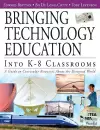
Bringing Technology Education Into K-8 Classrooms
3 contributors - Paperback
£37.99
Edward (Ted) Britton is associate director of the National Center for Improving Science Education (NCISE), housed within the Mathematics, Science, and Technology program of WestEd. Dr. Britton brings long experience in research and evaluation of curriculum issues and materials to this book. In collaboration with Senta Raizen and others, he developed methods for a cross-national comparison of textbooks in the Third International Mathematics and Science Study (TIMSS). He led a review of curriculum materials that connect science and mathematics to workplace contexts, Connecting Mathematics and Science to Workplace Contexts. Britton currently serves on the Technology Education Advisory Council of the ITEA. His earlier NCISE research includes comparing high-stakes mathematics and science examinations across countries and studying U.S. innovations in mathematics and science education as part of an international study under the auspices of the Paris-based Organization of Economic Co-Operation and Development (OECD). As project director for Mary Budd Rowe of the University of Florida during the 1980s, Ted developed the first CD-ROM in science education and produced videotapes for the professional development of science teachers. During the late 1970s, he taught science courses for Grades 7–12 at a rural junior-senior high school in Florida. Britton earned an EdD in science education, an MS in analytical chemistry, and a BS in chemistry and education from the University of Florida. Bo De Long-Cotty is a developmental psychologist and has worked for WestEd since 1991. She currently serves as a project director in the WestEd Math, Science, and Technology program and as director of the Learning and Teaching with Technology initiative for the WestEd Regional Technology Education Consortium (RTEC). Her work at WestEd includes directing pblnet.org, a project-based learning resource, guidance, and collaboration site for teachers; providing informa tion and resources to families and teachers to promote community–home involvement in schools; evaluating educational software and online curricula for Grades K–12; and evaluating and developing teacher professional development programs and projects. She is also Director of Educational Content for Alligator Planet, an animation company whose work includes children’s educational television programming. Dr. De Long-Cotty has served as director of evaluation for several science and math programs at the Lawrence Hall of Science at the University of California, Berkeley, as director of the GALAXY Classroom Science and Language Arts Evaluation for Teacher Universe/Riverdeep Publishing, and as director of evaluation for NASA’s online Celestia Solar System activities. Until 1995, she served as coordinator for the WestEd evaluation of the California Statewide Systemic Initiative, focusing on K–5 science and 6–8 mathematics. She has also developed multimedia curricula and products in language arts, math, and science for Disney Ed Studio and Holt, Rinehart, and Winston. Dr. De Long-Cotty earned an MA in developmental psychology from Teachers’ College/Columbia University and a PhD in developmental psychology from the University of California, Berkeley. Toby Levenson is a senior research associate for WestEd’s Mathematics, Science, and Technology program. She has worked in both the nonprofit and for-profit education sectors as an educational designer, producer, and manager. She has developed science software and videodiscs; created math software, video, and curricula; designed literacy soft ware and curricula; developed technology-related ancillar ies to textbooks; and produced other educational technology and edutainment products. She has been a primary contributor to more than thirty products from companies such as LeapFrog, The Learning Company, Scholastic Inc., Harcourt, D.C. Heath, Education Development Center (EDC), and CAST, among others. At WestEd, Levenson continues her interest in technology and curriculum with evaluating the effects of educational technology on student performance and developing interactive Web sites for teachers, curriculum specialists, and other school leaders. Levenson’s specialties include using interface, interactive, and information design to increase student learning; applying cutting-edge technologies to increase educational opportunities for students with disabilities; and conceptualizing and developing differentiated curriculum in mathematics, reading, and other subjects to meet the needs of all students. The daughter of an MIT-trained engineer and an art teacher, Levenson was building and designing inventions from a young age. After earning a BA, with a major in archaeology and a minor in computer science, Levenson was a computer programmer and trainer in industry for seven years while also serving as a curriculum advisor at the Boston Museum of Science. Levenson received an MEd in interactive technology in education from the Harvard Graduate School of Education.